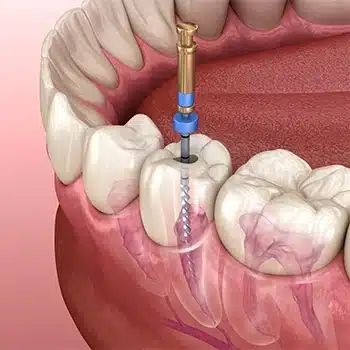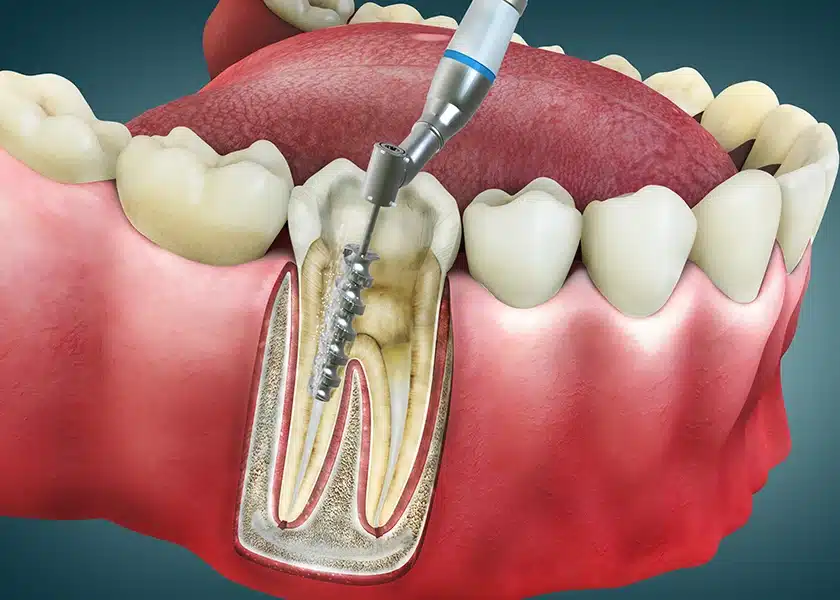Curious about the duration of a root canal procedure? “How long does a root canal take?” It’s a question that often arises when facing dental treatment. Root canals are a common dental procedure to treat infections and save teeth from extraction. Therefore, it is important for anyone considering this treatment to understand the time involved in a root canal.
Let us explore the root canal procedures, explore factors that influence the duration, and provide insights into what to expect during the process.
How long does a Root Canal take on certain types of teeth?
Several factors can influence how long a root canal takes. The complexity of the case, the number of roots in the tooth, and the overall health of the tooth are all important considerations. Additionally, the skill and efficiency of the dentist or endodontist performing the procedure play a significant role in determining the duration. If you’re wondering, “How long does a root canal take,” it typically ranges from 60 to 90 minutes per session, but it can vary depending on these factors.
Here’s a breakdown of how long a root canal takes on different types of teeth:
Canines and Incisors:
- These are the front teeth used for tearing and cutting food.
- Since they typically have only one root, root canals on these teeth are usually quick and straightforward.
Premolars:
- Located in the middle of your teeth, premolars may have one or two roots.
- Cleaning out the roots of premolars can take an hour or more due to their slightly more complex structure.

Molars:
- These are the large teeth at the back of your mouth, and they can have up to four canals.
- Because of their multiple canals and intricate anatomy, root canal procedures on molars are more time-consuming, often lasting 90 minutes or longer.
What can you expect during the Root Canal Procedure?
Root canals are fairly routine procedures commonly performed by dentists or endodontists. Much like getting a Dental filling, root canals are typically done in a single visit to your regular dentist’s office.
Here’s what happens during a root canal procedure:

Numbing the Area:
Just like with a filling, your dentist or endodontist applies a numbing gel to the gum surrounding the affected tooth and then injects a local anesthetic to ensure you don’t feel any pain during the procedure.
Accessing the Infected Pulp:
Once the area is numb, a small hole is drilled into the top of the tooth to expose the infected pulp. The dentist or endodontist then removes the infected pulp and cleans the inside of the tooth, applying an antibiotic to prevent any further infection.
Filling and Sealing the Tooth:
After cleaning out the tooth, it is filled and sealed with a special paste or synthetic material to prevent bacteria from re-entering. A temporary filling and sealant are applied to the tooth until a permanent filling or dental crown can be installed.
Follow-Up Appointment (Possibly):
In some cases, a follow-up appointment may be needed for your dentist or endodontist to do a permanent filling or place a crown on the tooth.
Overall, root canals are a common and effective way to save an infected tooth and relieve pain.
Do Root Canals Hurt?
Root canals are usually not more painful than other standard dental procedures because they’re done with local anesthesia. While you might feel some soreness, numbness, or mild discomfort for a day or two after the treatment, it can usually be eased with over-the-counter pain medications. Interestingly, the pain you experience from the infected tooth before the root canal is often much worse than any discomfort you might feel afterward. Most people can go back to their normal activities on the same day as the procedure.
How Long Does a Root Canal Take?
A root canal procedure typically takes a bit longer than a routine filling because it involves more steps, including anesthesia, preparation, and cleaning out the entire nerve of the tooth before sealing it. Simple root canals usually require just one appointment, lasting between 30 minutes to slightly over an hour. However, more complex cases may take 90 minutes or longer or even require a second appointment if additional treatments like a permanent filling or crown are necessary.
The duration of a root canal depends on various factors, such as the number of canals needing cleaning and the type of tooth being treated. While some teeth have only one root requiring treatment, others can have up to three roots that need attention.
What does Post-Procedure Recovery and Care include?
After a root canal procedure, it’s necessary to look after yourself to ensure a smooth recovery. Here’s what you can expect during the post-procedure recovery and how to care for your tooth:
Discomfort:
It’s common to feel some discomfort or mild pain following a root canal. This typically diminishes within a few days and can be alleviated with pain relievers like ibuprofen or acetaminophen.
Avoid Chewing:
To avoid causing additional irritation or harm to the newly treated tooth, avoid chewing on that side of the mouth until a permanent restoration, like a filling or crown, is installed. Eat only soft foods and avoid hard or crunchy foods that might lead to discomfort.
Follow-Up Appointment:
Attend any scheduled follow-up appointments with the dentist or endodontist. During these appointments, they will assess the healing progress and determine if further treatment is needed.
Oral Hygiene:
Be gentle while brushing and flossing around the treated tooth to avoid irritating the area. Rinse your mouth with lukewarm salt water several times a day to reduce the inflammation and promote healing.
Watch for Signs of Infection:
Keep an eye out for any signs of infection, such as persistent pain, swelling, or discharge from the treated tooth. If you notice any of these symptoms, contact your dentist immediately for further evaluation and treatment.
Attend Regular Dental Check-Ups:
Maintain regular dental check-ups to monitor the healing of your teeth and address any concerns. Your dentist can provide guidance on maintaining the health of your treated tooth and preventing future issues.
Conclusion
It is important to understand how long a root canal might take before deciding on the treatment. Although the duration can vary based on factors such as the tooth’s location and complexity, the main aim is to maintain oral health and ease any pain. If you’re considering a root canal, don’t hesitate to talk to your dentist for personalized guidance and care.
Ready to address your dental concerns and schedule a root canal treatment? Book an appointment online with Diamond Dental in Bellingham, WA, today! New patients can call (360) 516-4610, while all other callers can reach us at (360) 734-1999.
FAQ
The duration varies based on factors like tooth location and complexity, but it typically ranges from 30 minutes to over an hour.
Root canals are performed under anesthesia, so discomfort during the procedure is minimal. Some post-procedure soreness is common but manageable.
Sticking to soft foods immediately after the procedure is best to avoid aggravating the treated tooth. Once fully healed, you can resume your regular diet.








